Complete & Incomplete Sentences -> verb
Verb
A verb is a word that expresses an action, occurrence, or state of being. It is an essential part of speech in a sentence and helps to convey the meaning of the action taking place.
Types of Verbs
There are several types of verbs:
- Action Verbs: These verbs express physical or mental actions. Example: run, eat, think
- Linking Verbs: These verbs connect the subject of the sentence to a subject complement. Example: is, am, are
- Helping Verbs: These verbs come before the main verb and help to express the tense, mood, or voice of the main verb. Example: have, will, can
Verb Tenses
Verbs also have different tenses to indicate the time of an action or state of being:
- Present Tense: Indicates an action happening now. Example: I walk to school.
- Past Tense: Indicates an action that has already happened. Example: She danced at the party.
- Future Tense: Indicates an action that will happen in the future. Example: They will sing at the concert.
Study Guide
To understand verbs better, here are some study tips:
- Identify the verb in a sentence and determine its type (action, linking, or helping).
- Practice changing verbs from one tense to another (e.g., present to past tense).
- Create sentences using different verb tenses to demonstrate understanding.
- Use online resources and worksheets to practice identifying and using verbs correctly.
Understanding verbs is crucial for constructing clear and meaningful sentences. By studying the different types and tenses of verbs, you can improve your writing and communication skills.
[Verb] Related Worksheets and Study Guides:
.◂English Language Arts Worksheets and Study Guides Third Grade. Complete & Incomplete Sentences
Worksheet/Answer key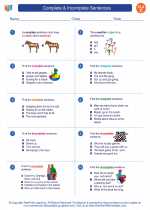 Complete & Incomplete Sentences
Complete & Incomplete Sentences  Worksheet/Answer key
Worksheet/Answer key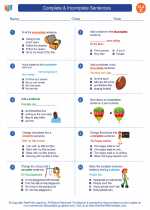 Complete & Incomplete Sentences
Complete & Incomplete Sentences  Worksheet/Answer key
Worksheet/Answer key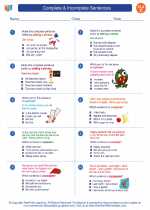 Complete & Incomplete Sentences
Complete & Incomplete Sentences  Worksheet/Answer key
Worksheet/Answer key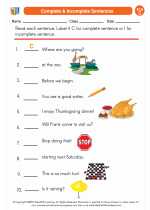 Complete & Incomplete Sentences
Complete & Incomplete Sentences  Worksheet/Answer key
Worksheet/Answer key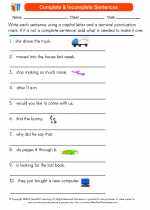 Complete & Incomplete Sentences
Complete & Incomplete Sentences 

 Worksheet/Answer key
Worksheet/Answer key
 Worksheet/Answer key
Worksheet/Answer key
 Worksheet/Answer key
Worksheet/Answer key
 Worksheet/Answer key
Worksheet/Answer key

The resources above cover the following skills:
LANGUAGE STANDARDS
Conventions of Standard English
Demonstrate command of the conventions of standard English grammar and usage when writing or speaking.